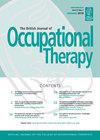Home environment design theories and models related to the occupational performance, participation and well-being of people with intellectual disabilities: A scoping review
IF 1.3
4区 医学
Q3 REHABILITATION
引用次数: 0
Abstract
Background: Access to housing for people with intellectual disabilities is often constrained by lack of choice, control and can often be inappropriate or unsafe. To enable people to remain at home and participate in their occupations, a collation and review of theories and models supporting good home environment design offers a view from which practice could be advanced. Method: A scoping review was used to map the literature on theories and models on home environmental designing, which can have influence on the occupational performance and participation of people with intellectual disabilities. The theories and models found were analysed using the lens of the Person-Environment-Occupation-Performance model. Results: Four themes supporting the understanding of environmental home design that can influence participation and well-being were found. These were offering safety and comfort; providing control and choice to manage stress; offering skill acquisition for continued learning and interest; and the person–environment interaction for function and participation. The themes are discussed in relation to participation in occupation and well-being for people with intellectual disabilities. Conclusion: The study contributes knowledge to practitioners and stakeholders on theories and models of home environment design which could support the occupational performance, participation and well-being of people with intellectual disabilities.与智障人士职业表现、参与及幸福感相关的家居环境设计理论与模型:范围回顾
背景:智力残疾者获得住房往往因缺乏选择和控制而受到限制,而且往往不适当或不安全。为了使人们能够留在家里并参与他们的职业,对支持良好家庭环境设计的理论和模型进行整理和回顾,为实践提供了一个可以推进的观点。方法:对影响智障人士职业绩效和参与的家庭环境设计理论和模型进行综述。运用人-环境-职业-绩效模型对所建立的理论和模型进行了分析。结果:四个主题支持环境家居设计的理解,可以影响参与和福祉被发现。它们提供了安全和舒适;提供控制和选择来管理压力;为持续学习和兴趣提供技能获取;以及人与环境互动的功能和参与。讨论了与智力残疾者参与职业和福利有关的主题。结论:本研究为智障人士家庭环境设计的理论和模型提供了理论和模型,为智障人士的职业表现、参与和福祉提供支持。
本文章由计算机程序翻译,如有差异,请以英文原文为准。
求助全文
约1分钟内获得全文
求助全文
来源期刊

British Journal of Occupational Therapy
REHABILITATION-
CiteScore
2.20
自引率
15.40%
发文量
81
审稿时长
6-12 weeks
期刊介绍:
British Journal of Occupational Therapy (BJOT) is the official journal of the Royal College of Occupational Therapists. Its purpose is to publish articles with international relevance that advance knowledge in research, practice, education, and management in occupational therapy. It is a monthly peer reviewed publication that disseminates evidence on the effectiveness, benefit, and value of occupational therapy so that occupational therapists, service users, and key stakeholders can make informed decisions. BJOT publishes research articles, reviews, practice analyses, opinion pieces, editorials, letters to the editor and book reviews. It also regularly publishes special issues on topics relevant to occupational therapy.
 求助内容:
求助内容: 应助结果提醒方式:
应助结果提醒方式:


